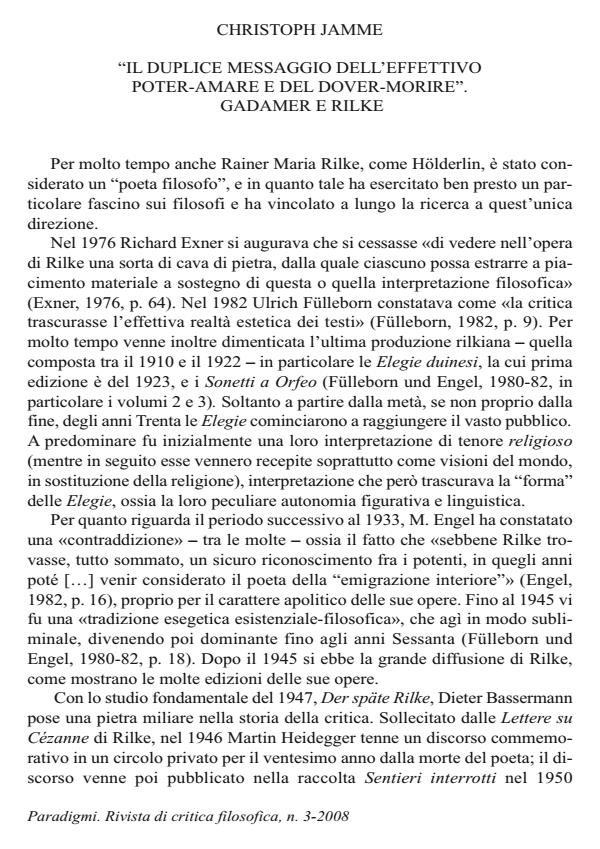"Il duplice messaggio dell'effettivo poter-amare e del dover-morire" Gadamer e Rilke
Titolo Rivista PARADIGMI
Autori/Curatori Christoph Jamme
Anno di pubblicazione 2009 Fascicolo 2008/3 Lingua Italiano
Numero pagine 14 P. 67-80 Dimensione file 79 KB
DOI
Il DOI è il codice a barre della proprietà intellettuale: per saperne di più
clicca qui
Qui sotto puoi vedere in anteprima la prima pagina di questo articolo.
Se questo articolo ti interessa, lo puoi acquistare (e scaricare in formato pdf) seguendo le facili indicazioni per acquistare il download credit. Acquista Download Credits per scaricare questo Articolo in formato PDF

FrancoAngeli è membro della Publishers International Linking Association, Inc (PILA)associazione indipendente e non profit per facilitare (attraverso i servizi tecnologici implementati da CrossRef.org) l’accesso degli studiosi ai contenuti digitali nelle pubblicazioni professionali e scientifiche
"Il duplice messaggio dell'effettivo poter-amare e del dover-morire" Gadamer e Rilke - Gadamer and Rilke This essay analyses Gadamer’s interpretation of Rainer Maria Rilke’s poems and their influence on his conception of philosophical hermeneutics, especially on the concept of play, seen as the basic metaphor of hermeneutical dialogue and understanding. The author shows that Gadamer’s interest for Rilke dates back to the 30’s and 40’s, although his essays on Rilke were published between 1955 and 1976 and later collected in the ninth volume of his Gesammelte Werke entitled Ästhetik und Poetik II: Hermeneutik im Vollzug. In his essays, Gadamer focuses his attention on Rilke’s later works Duineser Elegien and Sonette an Orpheus concentrating on some of the main themes of Rilke’s poetry such as the father and son relationship, his doctrine about love and death, the role of punctuation, and many others. Particular attention is paid to Gadamer’s thesis on the importance of the mythopoetical overthrow in Rilke’s work, and to his rejection of any theological interpretation of Rilke’s conception of life, love and death. In conclusion, the author deduces from his analysis that Gadamer’s interpretations of the Sonette and Elegien are milestones in the advanced research on Rilke’s work.;
Christoph Jamme, "Il duplice messaggio dell'effettivo poter-amare e del dover-morire" Gadamer e Rilke in "PARADIGMI" 3/2008, pp 67-80, DOI: